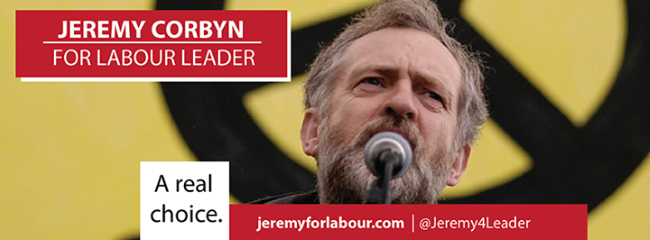In the dying days of Labour’s Leadership selection, the key issues remain those of economics & strategy, but also unfortunately now one of mandate.
The debate on economics has come to be between Cooper and Corbyn. Demanding credibility is not an economic policy and so we can ignore Kendall & Burnham. I summarise the other’s two positions below and conclude that Corbyn’s economic manifesto is not just a shopping list of desirable reforms, they are a single set of reinforcing measures to fix and rebuild the economy so it works in the interests of the majority of people.
This was meant to be a short blog, emphasising the economy and virtuously circular, self reinforcing nature of Corbyn’s programme, but I also take the opportunity to look at the defence and foreign policy debate and conclude with some comments on the election process itself and Labour’s future.
I am glad I voted for Jeremy Corbyn, but I am not a Corbynista, I am Real Labour.
Cooper opposes radical monetary policy and opposes re-nationalisations. She’s for investment in science, a credible public finance policy, remaining in the EU to enable exports, for universal free child care, and ending child poverty. For more…. She was even more certain that “People’s Quantitative Easing” PQE will cause inflation on Sky’s Leader’s Hustings, earlier this week but she’s wrong and most economists disagree with her.
Corbyn proposes to use radical monetary policy to stimulate growth, to renationalise the railways and electricity companies, to among other things ensure that the current public subsidy is retained as a public benefit. Further more he proposes a National Education service to enable people to acquire the skills needed in a high skill, high wage economy. He proposes free Higher Education for the same reasons and to properly fund the Universities, the centre of the UK’s innovation and creativity. For more …
The deficit is not a policy lever, it’s an outcome. It can’t be fixed by cutting expenditure, it can only be fixed by growth. Radical monetary policy will drive growth, not inflation because there’s massive capacity in the economy. The renationalisations of the railways and energy companies will ensure that the multiplier works at its most effective by stopping a profits leak. Housing investment for affordable housing will benefit us all, the newly housed obviously, the multiplier on the building investment and the reduction in housing benefit to the tax payer. The use of a National Investment Bank will negate the investment strike and the banks failure to recirculate savings and ensure that the industry and jobs created are high wage and high skills. A national education service and free university courses will ensure that both tomorrow’s work force and today’s are equipped to do this work and labour market & trade union law reforms will ensure that workers get their fair share of the wealth created,
This is not a shopping list of desirable reforms, these are reinforcing measures to fix and rebuild the economy so it works in the interests of the majority of people.
To me it’s good that Cooper has finally engaged on the economics, because the argument that Corbyn can’t win as a sufficient reason for voting for someone else assumes that any of the other three have a better chance. The questions we need answers to are both those of platform and strategy. At least now, Cooper is seeking to offer a choice on both issues, although I think she’s on the wrong side on both.
When considering the issues of strategy, Labour failed to win votes or lost votes in four directions, to the Left, disastrously so in Scotland, to the Right, the Tories, to UKIP and to staying at home. In order to win again Labour has to win back voters from all four of these directions. I really question if any of them other than Corbyn can do that. Labour’s strategy choice, it would seem to me is between more triangulation or a clear choice. The Darling plan and triangulation have now lost the last two elections, we need to change the question and change the answer.
ooOOOoo
The other critical platform questions relate to War & Peace. i.e. Defence & Foreign policy. The UK’s defence policy choices haven’t changed since the mid-eighties. We can’t afford the nukes, sufficient war plane types, an effective army and a defensible and effective surface fleet. Procurement is out of control and our military leadership’s strategic ideology remains one war behind. We can’t afford to defend both Europe and mount an expeditionary force. We can’t afford first class technology any more. Military technology works because it’s new and different and expensive to copy and counter. Collective security is now an essential part of Britain’s defence. The key to sustainable defence is an effective foreign policy with peace making and the rule of law at its heart. The two major threats to Britain’s peace are Russia and the Middle East; a settlement in the Middle East needs justice for the Palestinians and rearming won’t stop Russia.
As part of the so-called debate on foreign policy, Corbyn, the National Chairman of “Stop the War” has been attacked for having unsavoury, morally repugnant friends. I’ll leave it to Peter Tatchell to say what needs to be said.
I have old friends in the centre left, and new allies who were happy with the politics of Ed Miliband’s leadership who question who to vote for and are surprised and some dismayed that the Left candidate is a member of the Campaign group; we would seem to have the choice of moving left or right.
On social, domestic and defence policy, Corbyn’s proposals are neither extreme nor unrealistic. Some of these old friends seem to have a vitriolic opposition to Corbyn and support Cooper or Kendall with a passion, to me beyond reason and certainly to the detriment of the election; they will make post election party unity hard as does some of the lack of transparency in running the election. But in making the choice we must all answer the questions I pose. What do you object to? Why do you think that the others will do better electorally in five years time? If winning more Tories to us is the only path to Downing Street, what policy promises do you think that Cooper, Burnham or Kendall can make to do this.
ooOOOoo
This is Labour’s first experiment with primary elections, some of the language and the attack lines have been harsh, but it’s one of the reasons that primaries are under taken; if they can’t take it from their comrades, they won’t be able to take it from the Tories and the tabloid press, and the weakness of all candidates should be discovered; at least we’re not looking at their mental health records. Frankly, I think calling Blairism a virus, and even Blair’s heart transplant comments while a bit hyperbolic are within legitimate terms of the debate; responding by attacking the legitimacy of the comments merely avoids the politics and reinforces the attacks on the legitimacy of the election, its participants and its mandate. It is unacceptable to attack the validity of the election and its subsequent mandate.
Some question if we should be running a closed primary. This of course raises the issue of the openness of the election and once again its legitimacy. I still haven’t stopped laughing about the turnaround, in that in Feb 2014, the left opposed the reforms, and it was Labour’s right who championed it, and now of course, it’s the other way round. I believe that the numbers participating have made this a success but I wish that Unison and the GMB had been as active as Unite in recruiting affiliated members and I wish more people, who’ve always voted Labour and did so with difficulty this time had signed up. Many members of the PLP and the commentariat underestimate the turnover of Labour’s membership and its anger that despite its discipline in following Ed Miliband’s leadership under the threat that divided parties lose, we still lost on a manifesto containing promises that it would seem many found insufficient or distasteful. The unseemly focus on the new joiners and the registered supporters, means that this turnover is being underrated. Tony Blair and David Miliband’s supporters are no longer members of the Labour Party.
The clumsy and opaque way in which the checks on new members and supporters have been handled also adds to the sense of farce and undermines all those local parties and officials, members and supporters who have acted in good faith. The internal rules I have seen, in previous selections, prohibit bringing the party into disrepute and they have a form of words about how one may refer to other candidates. This has fallen by the way side, and was always likely to do so in the internet election.
Despite all this, the next leader of the Labour Party will have the most powerful mandate to lead the Labour Party ever. It’s down to all of us to make it work; it wasn’t the local activists or new joiners who let us down in May.
ooOOOoo
For more by me on Triangulation, see If Only on this blog.
The featured image is taken from the Guardian, the other’s are credited elsewhere on this blog, Corbyn is his, the Bank is mine, the Hebron school kids are Mel Wards +
This took days to write and edit and is backdated to when I started it.


